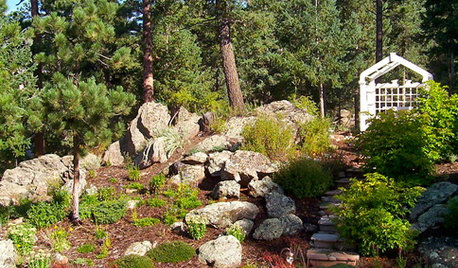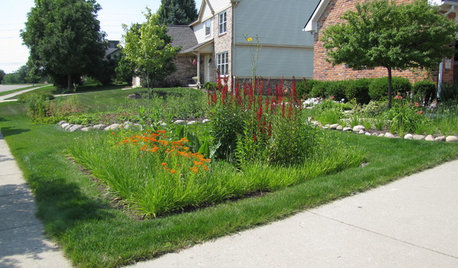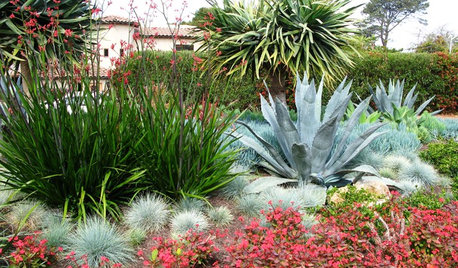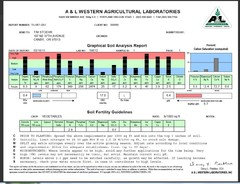Where do you have your Soil Tested
John near Toledo
8 years ago
Featured Answer
Sort by:Oldest
Comments (24)
kimmq
8 years agoRelated Discussions
What you learn from having soil professionally tested
Comments (8)I had my soil tested last year - because I used soil from the local compost facility to get started - it had about 80% composted horse manure mixed in with regular compost as the other 20% (so they told me anyways). I learned that even though you can buy your own test kits, the one I got wasn't correct at all. The test kit showed a pH of 8 or higher. After the professional soil test, it came back showing 7.2 for the pH. As for phosphorous and potassium, the company showed that I was well over the requirements. Phosphorous was read at 310 lbs/acre with the soil mixture - and the optimal level is only 50 lbs/acre. Potassium was read at 800 lbs/acre and optimal was 300 lbs/acre. They didn't test nitrogen because they said it is easily lost with rain so it dramatically changes from one reading to the next. Here is a link that might be useful: BsnTech Gardening Blog...See MoreDo you recommend professional soil testing?
Comments (12)anntn: thank you for your comprehensive answer! I'm in Ontario, Canada (not California) and we're on Canadian Shield bedrock. Pretty uniform! According to soil maps of the region, I should expect clay till soil, and that's pretty much been my experience. michealg: yes, I expect that the kit wasn't particularly reliable. LynnT: Thank you for the tip about universities. An excellent idea! There's a service through the University of Guelph, which is a big aggie school not too far from here. subk3: Thank you so much for the great information about phosphorous and the link to that wonderful essay. I also navigated to the Dr Chalker-Scott's website and am looking forward to reading up on soils and other gardening practicalities in more detail. Cecily: I assume that was a rhetorical question, but even so I'm going to answer it! lol. Julia Child looked great all season last year - plentiful, healthy green foliage and great repeat on her blooms. She's truly a star. Wild Blue Yonder also grew well, though was stingy with blooms and hardly repeated at all. The rest (Blue Girl HT cl., Bolero, Carefree Beauty are a few) were pretty leggy and sparse, though they're all young plants (1 - 2 years, 3 for BG) so that's not necessarily indicative of anything. In any case, I really appreciate all the help! Please, keep it coming! :) Happy New Year, Karen...See MoreHow Often Do You Test YourSoil?
Comments (5)You should tell the lab what you wish to grow so they can council you on your soil. Talk to the lab before collecting the test soil to get their directions. If you want every possible test done it can cost hundred of dollars and be a waste of money. A basic test costs around $30 and gives you all you need to know about your soil. mrandmsgreengenes something other than zone 17 would help us know where you are gardening and allow more local information to be offered. Al...See Moresoil testing: results and your soil improvement after testing.
Comments (5)Wavering on replying, trying to be polite and stay on topic. I think a lot of regulars here have already read about NPK and know what a soil test is. You don't really have to reinvent the wheel, there's a balance between writing your own content and simply reading/sharing what has already been explained. Regarding the 'chemical push,' in short everything is case by case devil in the details in my view. It would depend on what soil test, what is measures, who does it, what they are recommending, have they demonstrated examples of their work, are they benefiting financially from what is happening, and so on. It's not that there is a chemical side and an anti-vaxxer side, it just actually depends on what it is. The science and scientific process is extremely important, but if you are getting so mired in the details and big words that you don't even understand what all the terms numbers and graphs mean, and it's blocking your view of just looking at the dirt, crumple the paper and bin it IMO....See MoreJohn near Toledo
8 years agotoxcrusadr
8 years agotoxcrusadr
8 years agogardengal48 (PNW Z8/9)
8 years agonancyjane_gardener
8 years agoJohn near Toledo
8 years agoJohn near Toledo
8 years agokimmq
8 years agotoxcrusadr
8 years agotcstoehr
8 years agotcstoehr
8 years agolast modified: 8 years agoJohn near Toledo
8 years agotcstoehr
8 years agoJohn near Toledo
8 years agokimmq
8 years agoLloyd
8 years agogardengal48 (PNW Z8/9)
8 years agoJohn near Toledo
8 years agotoxcrusadr
8 years agotoxcrusadr
8 years agoLloyd
8 years agokimmq
8 years ago
Related Stories

GARDENING GUIDESHow to Stop Worrying and Start Loving Clay Soil
Clay has many more benefits than you might imagine
Full Story
GARDENING GUIDESGet the Dirt on Your Garden’s Soil
Understand how your soil supports your plants so you can ensure your garden’s success
Full Story
GARDENING GUIDESHave Acidic Soil in Your Yard? Learn to Love Gardening Anyway
Look to acid-loving plants, like conifers and rhododendrons, to help your low-pH garden thrive
Full Story
GARDENING GUIDESThe Poop Scoop: Enrich Your Soil With Good Old Manure
Get over the ick factor already — this natural super-ingredient for soil has so many benefits, you'll wonder why you ever went chemical
Full Story
FARM YOUR YARDHow to Get Good Soil for Your Edible Garden
The nutrients in your soil feed the plants that feed you. Here are tips on getting it right — just in time for planting season
Full Story
GARDENING GUIDESGardening Solutions for Heavy Clay Soils
What’s a gardener to do with soil that’s easily compacted and has poor drainage? Find out here
Full Story
LANDSCAPE DESIGNHow to Shape a Rain Garden and Create the Right Soil for It
Learn how to grade, lay out and amend the soil in your rain garden to support your plants
Full Story
GARDENING GUIDESGardening Solutions for Dry, Sandy Soils
Has your desert or beachy site withered your gardening creativity? Try these ideas for a beautiful, easy-care landscape
Full Story
GARDENING GUIDESGrow a Beautiful Garden in Alkaline Soil
Got alkaline soil? Learn how to manage it and the many beautiful plants that will thrive in this ‘sweet’ soil
Full Story
GARDENING GUIDESHow to Pick a Mulch — and Why Your Soil Wants It
There's more to topdressing than shredded wood. Learn about mulch types, costs and design considerations here
Full Story




gardengal48 (PNW Z8/9)